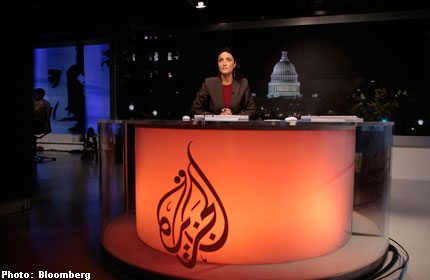
LONDON - Even as Al-Jazeera busies itself with its expansion into the United States next month, the Middle East-based broadcaster is coming under attack on its home turf.
While few doubt Al-Jazeera's deep pockets and ambition to take on the likes of CNN, the launch of its US-based cable station comes at a tumultuous time for the network - it has become embroiled in the latest upheavals in the Arab world, with its professional standards and impartiality called into question.
To be sure questions of bias have been raised before.
Launched in 1996 with an initial grant of US$150 million (S$189 million) from the then Emir of Qatar, Al-Jazeera's programming upset some of the region's monarchies. They demanded to know why it pried into their most intimate affairs but somehow never bothered to report about Qatar's royal family.
But the network did revolutionise the media of the Arab world with its emphasis on speaking for the common man, and slick, Western-style presentation. In just a few years, it reached an estimated 70 million households in the Arab world.
In December 2010, it broadcast the grainy pictures of protests which followed the suicide of a young Tunisian market stallholder, an event which set off the wave of revolts which came to be known as the Arab Spring.
And it broadcast live the mass demonstrations from Tahrir Square which brought down Egyptian President Hosni Mubarak. The channel, US Secretary of State Hillary Clinton told Congress in March 2011, was "changing peoples' minds and attitudes". "And like it or hate it," she added, "it's really effective."
But that was precisely the moment when the network's shining star appeared to wane. Mirroring the stance taken by Qatar's rulers, it offered unstinting support to the Muslim Brotherhood in Egypt and to anti-government rebels in Syria.

Sometimes the network's coverage ignored basic journalistic quality controls by broadcasting footage supposedly taken from the Syrian civil war without corroborating its sources.
At times, Al-Jazeera's apparent editorial preferences had unintended, comical results, such as when its reporters had to snatch their microphones back from passers-by in Egypt who dared to criticise the Muslim Brotherhood.
And, as millions of Egyptians came out to protest against President Mohamed Mursi and the Muslim Brotherhood recently, Al-Jazeera pretended that nothing was happening, broadcasting football updates instead.
The network has many outlets, including a 24-hour English-language service which is noticeably more careful about upholding its impartiality.
But that brings its own problems: Sultan Al Qassemi, a Gulf-based commentator with a large following in the Arab world, charges that Al-Jazeera suffers from a "Yasser Arafat syndrome", a reference to the late Palestinian leader who had a habit of tailoring his message depending on his audience.
Be that as it may, Al-Jazeera is now treated with contempt in Egypt: Its Cairo chief Abdul Fattah Fayed was chased out of a press conference earlier this month by other journalists, and its offices in the Egyptian capital were closed down by the military.
"By cheerleading for the Brotherhood, the station has effectively lost its market in the region's most populous country and become a pariah," says Mr Adel Iskandar, a Washington-based scholar of Arab studies.
That may be an exaggeration, especially since the Middle East competition to Al-Jazeera - led by Al-Arabiya, a Saudi-funded network - is not regarded as impartial either.
Nevertheless, the dispute provides an inauspicious backdrop to the network's entry into the US market.
Mr Mustafa Sawwaq, acting director-general of Al-Jazeera Media Network, said the station has already hired "hundreds" of journalists as part of its efforts to create a mainstream news channel to rival dominant American corporations such as CNN or Fox.
Yet Mr Ehab Al Shihabi, Al-Jazeera's executive director of international operations, recently admitted that his network will face an uphill battle in attracting a loyal US audience, although he claims that the challenge is one faced by any start-up channel.
Having bought the Current TV network from Mr Al Gore, the former US vice-president, for a reputed US$500 million and having sunk as much again in preparations for next month's launch, Al-Jazeera is determined to make its gamble work.
But as its bosses know, US media commentators cannot wait to pounce on the first evidence of alleged bias.

